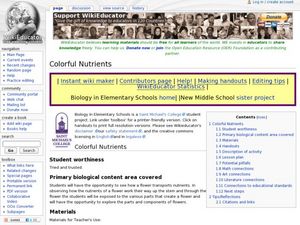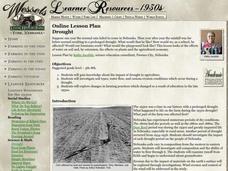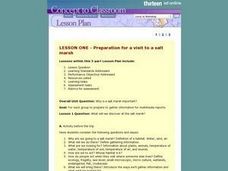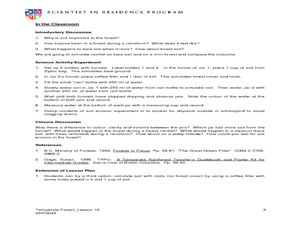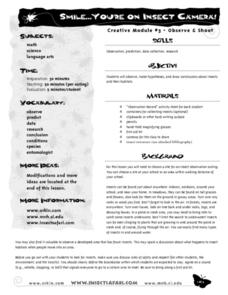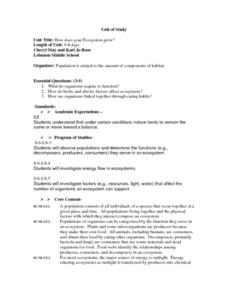Curated OER
Paper Chromatography-Chemical and Mechanical
Students perform paper chromatography to determine pigments in plants. In this paper chromatography lesson plan, students isolate leaf pigments, prepare a chromatogram and place their chromatogram in a solvent to separate the pigments....
Curated OER
Colorful Nutrients
Young scholars participate in an experiment to understand how plants get nutrients. In this plant nutrition, lesson students examine how colored water goes through the stem of a plant to the flower. Young scholars discuss the parts of...
Curated OER
Acid Mine Drainage
Students use cabbage, backing soda, cobblestones, and more to test the acid in the water. For this acid mine damage lesson plan, students complete 13 experiments to test and treat acid.
Curated OER
Introduction to Coral Reefs
Students identify locations of coral reefs, both in the water and around the globe, identify relative depth of corals in the ocean by observing behavior of cold and warm saltwater, and create models of coral reefs.
Curated OER
Rate of Photosynthesis
Young scholars investigate the rate of photosynthesis using elodea leaves. In this photosynthesis lesson plan, students place elodea in a test tube filled with water. They include baking soda and place the test tube under a lamp. Young...
Curated OER
WHAT'S ORGANIC?
Students explore how certain foods come to be certified "organic." They write the words "organic" and "synthetic" and given the definitions of each. Students are given dictionaries. They are asked: "What is organic food?" Students grow...
Curated OER
Reversible and irreversible changes
Students experiment with solids and liquids to find which solids will dissolve in water. This dissolution and mixtures lesson can be completed online or in class as all materials are connected to the lesson plan for both settings.
Curated OER
Introduction to Restoration Lesson
Students explore how pollution and invasive plants disrupt the ecosystem. In this restoration lesson students list materials that pollute wetlands, how people can keep them clean and ways in which invasive plants establish.
Curated OER
Who Eats Who?
Learners recognize that some animals eat plants, some eat meat and some both. In this who eats who lesson, students chart animals in a food chain. Learners research information from reading articles. Students chart what...
Curated OER
Photosynthesis
Students conduct a variety of experiments on photosynthesis. In this biology lesson, students identify the factors required for the process to occur. They perform computerized experiments to test the amount of oxygen produced when plants...
Curated OER
Drought
Students gain knowledge about the impact of drought in agriculture. They investigate soil types, water flow, and various erosion conditions which occur during a drought and see how farming practices changed after the 1930's.
Curated OER
Soil pH Effect on Germination of Specific Weeds
Students collect weed seeds from three varieties of weeds (knapweed, thistle, or toadflax, for example they may choose others in addition to the spotted knapweed.) They sterilize soil for thirty containers, plant seeds in sterile soil,...
Curated OER
Why is a salt marsh important?
Students discuss the salt marsh. They define the following terms: habitat, water, land and air. Students work in small groups. They are asked why are they going to a salt marsh? Students discuss whose habitat is it at the salt marsh.
Curated OER
Dolphins
Students explore sea life. In this cross curriculum fine arts, science, and P.E. "dolphins" activity, students sing songs and play games about dolphins, perform water experiments, create mosaics, and use their five senses to explore sand...
Curated OER
Nutrition: It's In Your Hands
Fourth graders use this lesson plan to focus on their health, nutrition and the state of the environment. In groups, they examine the various types of land, water and air pollutants and compare and contrast a food chain with and without...
Curated OER
Seed Germination
Students explore the process of seed germination. In this botany lesson, students complete an experiment with seeds. Students observe soaked and dry seeds. Students allow the seeds to germinate and make observations during this time....
Curated OER
What's in the Soil?
Fourth graders examine soil to find its contents, and how much water and air they can measure. In this soil composition lesson, 4th graders perform three experiments and record their results. In one experiment they examine...
Curated OER
Searching for Meteorites
Students examine meteorites and attempt to recover meteorite fragments. In this space instructional activity students complete a demonstration on the impact of a meteorite using water balloons and make experimental predictions.
Curated OER
Ocean Pollution
Young scholars explore ocean pollution. In this ecology lesson, students view a video entitled This Pretty Planet and identify common biodegradable products. Young scholars participate in activities designed to simulate the...
Curated OER
Forest as a Filter
Learners experiment using soil and water. In this forest as a filter lesson, students identify the role of forest cover, vegetation, and foliage impacts erosion and evaporation. Learners conduct a simple experiment, form a hypothesis,...
Curated OER
Growing Barley for Use in Biosynthesis Experiments
Students attempt to determine the optimum growing conditions for barley. They assess the effects of a number of substances such as ammonium chloride and urea on the plants
Curated OER
A Model Estuary
Young scholars assemble a poster of an estuary showing the five communities of animals and plants that inhabit the estuary. They research the concept of an estuary and find photographs or diagrams of various estuaries to identify and...
Curated OER
Smile...you're on Insect Camera!
Young scholars study insects. They go on an outdoor insect outing and look for insects in a variety of places--in the air, under rocks, on leaves, in water, etc. They record information about the insects they find, including habitat,...
Curated OER
How Does Your Ecosystem Grow?
Students consider that under certain conditions in nature tend to remain the same or move toward a balance. They observe populations and determine the functions (e.g., de-composers, producers, consumers) they serve in an ecosystem. They...
Other popular searches
- Compare Water and Land Plants
- Animals Plants and Water
- Plants Clean Water
- Waste Water Treatment Plants
- Dirty Water Plants
- Plants and Water Movement
- Nyc Water Treatment Plants
- Plants Need Water
- Plants Water Uptake
- Air Water Plants Animals
- How Plants Absorb Water
- Plants Water Osmosis

